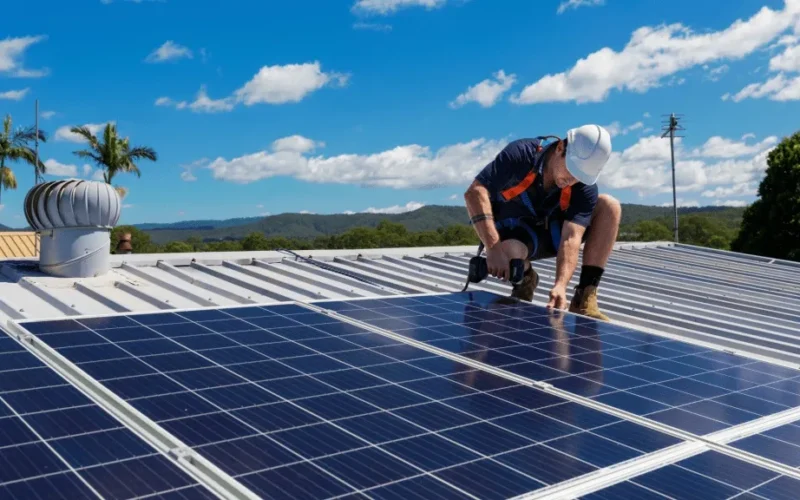The integration of solar panels and smart home technology represents a powerful synergy in the quest for energy efficiency, sustainability, and convenience. While solar panels harness the sun’s energy to produce electricity, smart home systems enable efficient energy management and control. This article explores the significant connection between solar panels and smart homes, showcasing how these two technologies work together to create a more sustainable and intelligent living environment.
Understanding Solar Panels
Solar panels, also known as photovoltaic (PV) panels, are devices that convert sunlight into electricity. They consist of multiple solar cells made from semiconductor materials, typically crystalline silicon. When sunlight strikes these cells, it excites electrons, generating direct current (DC) electricity. An inverter then converts this DC electricity into alternating current (AC) electricity, which is compatible with the electrical systems in homes and buildings.
The Benefits of Solar Panels:
- Clean and Renewable Energy: Solar panels produce clean electricity from sunlight, reducing reliance on fossil fuels and minimizing greenhouse gas emissions.
- Lower Energy Bills: Solar power can offset or even eliminate electricity bills, leading to long-term savings for homeowners.
- Environmental Sustainability: Solar energy contributes to a more sustainable future by reducing the carbon footprint and dependence on non-renewable resources.
- Energy Independence: Solar panel owners gain greater energy independence, relying less on centralized utilities and grid power.
Understanding Smart Home Technology
Smart home technology involves the integration of various devices and systems into a connected network that can be controlled and automated through a central hub or mobile application. These devices often include smart thermostats, lighting systems, appliances, security cameras, and more. Smart home technology offers several benefits:
- Convenience: Smart homes allow for remote control and automation of various devices, making daily tasks more convenient.
- Energy Efficiency: Smart thermostats and lighting systems can optimize energy consumption, reducing electricity and heating costs.
- Security: Smart security systems provide real-time monitoring and notifications, enhancing home security.
- Environmental Impact: Energy-efficient devices and automation help reduce energy waste and minimize the carbon footprint.
The Synergy Between Solar Panels and Smart Homes
- Energy Monitoring and Management: Smart home systems can monitor energy consumption in real-time. When integrated with solar panels, homeowners can see how much electricity is being produced and consumed. This insight helps optimize energy usage, ensuring surplus solar energy is used efficiently or stored for later use.
- Smart Thermostats: Smart thermostats can adjust heating and cooling settings based on solar production and occupancy. When solar energy is abundant, the thermostat can lower energy consumption from the grid, reducing electricity bills. Additionally, homeowners can remotely control the thermostat, ensuring comfort upon arrival home.
- Energy Storage Integration: Combining solar panels with home energy storage systems, such as batteries, enhances energy self-sufficiency. Smart home technology can manage the charging and discharging of batteries based on energy production and consumption patterns.
- Time-of-Use Optimization: In regions with time-of-use pricing, smart home systems can schedule energy-intensive tasks, such as laundry or charging electric vehicles, to coincide with periods of lower electricity rates or when solar production is high.
- Appliance Control: Smart plugs and outlets allow homeowners to control appliances remotely. This feature can be used to turn off or reduce the power to non-essential appliances when excess energy is not available.
- Home Automation: Smart home automation routines can be programmed to adjust lighting, blinds, and HVAC settings based on solar energy availability, occupancy, or time of day. For example, blinds can close during the hottest part of the day to reduce cooling needs.
- Energy Data Visualization: Many smart home systems offer energy data visualization, showing users how their energy consumption and solar production correlate. This information can empower homeowners to make informed decisions about their energy usage.
- Security and Monitoring: Smart home security systems, integrated with cameras and sensors, can use solar-powered components, ensuring they operate independently of the grid. This enhances security during power outages and reduces reliance on grid-connected security solutions.
Benefits of the Solar-Smart Home Integration:
- Increased Energy Efficiency: The combination of solar panels and smart home technology can lead to improved energy efficiency, reduced energy waste, and lower utility bills.
- Optimized Energy Usage: Smart home systems help homeowners make the most of their solar energy production, ensuring surplus energy is put to good use rather than being sent back to the grid.
- Enhanced Comfort: Smart thermostats and automation routines ensure a comfortable living environment while minimizing energy costs.
- Environmental Impact: The integration of solar panels and smart home technology aligns with sustainability goals by reducing carbon emissions and dependence on fossil fuels.
- Energy Independence: Homeowners with solar-smart home systems gain greater energy independence, relying less on external energy sources and grid power.
Challenges and Considerations
While the integration of solar panels and smart home technology offers numerous benefits, there are some challenges and considerations to keep in mind:
- Initial Costs: Both solar panels and smart home devices may have upfront costs. Homeowners should consider their budget and long-term savings when investing in these technologies.
- Compatibility: Ensuring that smart home devices are compatible with each other and with the solar system can be complex. Consulting with a professional installer or using compatible devices from the same manufacturer can mitigate compatibility issues.
- Data Privacy and Security: Smart home devices may collect and transmit data, raising privacy and security concerns. It’s essential to choose reputable brands and implement security measures to protect sensitive information.
- Maintenance and Updates: Regular maintenance and software updates are necessary to keep both solar panels and smart home devices operating efficiently and securely.
Conclusion
The integration of solar panels and smart home technology represents a powerful combination that can lead to increased energy efficiency, reduced environmental impact, and enhanced convenience for homeowners. The synergy between these technologies allows homeowners to maximize their solar energy production, optimize energy usage, and enjoy a more comfortable and sustainable living environment. As both solar panels and smart home devices continue to evolve and become more accessible, their integration is poised to play a vital role in the transition to a greener and more intelligent future.







